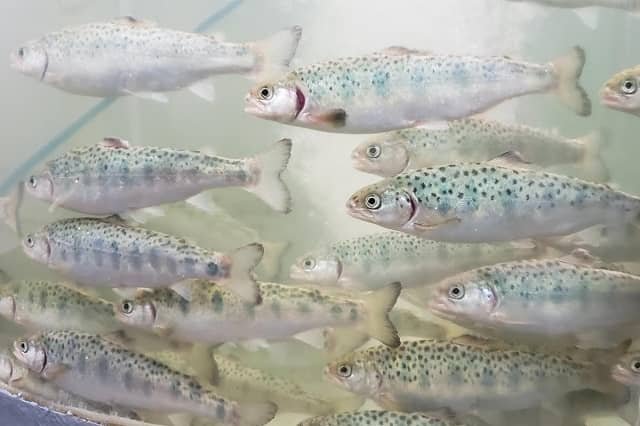
There is consensus in affirming that the health and well-being of fish is highly influenced by their microbiota, which can play a fundamental role in different biological processes such as metabolism and immune response of the fish.
Therefore, it is important to understand how the microbiome of organisms is altered by environmental effects and host conditions and how this influences the health of the host. In this regard, the “Aquaculture Genomics” line (RP1) of the Interdisciplinary Center for Aquaculture Research (INCAR) is carrying out a series of studies to understand the factors that shape the intestinal microbiota in fish, in order to promote healthy organisms, favoring their well-being in aquaculture production.
Recently, the researchers of INCAR RP1, Dr. (c) María F. Morales-Rivera, Dr. Diego Valenzuela-Miranda, Dr. Gustavo Núñez-Acuña, Bárbara P. Benavente, Dr. Cristian Gallardo-Escárate and Dra. Valentina Valenzuela-Muñoz, published “Atlantic Salmon (Salmo salar) Transfer to Seawater by Gradual Salinity Changes Exhibited an Increase in The Intestinal Microbial Abundance and Richness”, a study that delves into the bacterial communities associated with the process of transferring salmonids from freshwater to freshwater. of sea. For which the researchers used an experimental design where the intestinal microbiota of salmon transferred to seawater was evaluated under different strategies: saline shock, gradual change in salinity and use of a food with a special formulation to prepare a more robust fish at the moment. of transfer to the sea.
“This study aimed to explore the diversity and abundance of intestinal microbiota in Atlantic salmon during transfer to seawater under three strategies: One group was exposed to gradual salinity change, a second group to salinity shock, and the third was fed a functional diet prior to transfer to seawater. For this, Oxford Nanopore sequencing technology was used, which allows sequencing the complete 16S gene, allowing identification at the species level in the samples analyzed. Additionally, the study describes the possible functionality of the microbial communities that are identified in each group of fish”, explain the researchers from the INCAR Center about the first study that evaluates the intestinal microbiota of Atlantic salmon exposed to gradual changes in salinity during smoltification. .
The findings revealed that the group exposed to salinity changes and the group fed with a functional diet present a greater microbial diversity, suggesting a positive relationship between bacterial communities and the health of fish transferred to seawater, under both strategies. “The results obtained can be used as an additional tool for the evaluation of smolts prior to their transfer to seawater, it would help in the well-being and survival of Atlantic salmon during the transfer stage to seawater”, the scientists highlight. .
The study shows that carrying out the transfer of fish through gradual salinity changes, there is a greater richness in the bacterial communities of the fish, which could be associated with better health conditions of these. Within the bacterial communities, proteobacteria were dominant. However, the Investigators observed variations in the lower taxonomic levels between the experimental groups. Additionally, the INCAR Research team, due to the methodology used for the microbiota study, was able to identify the functional role of the bacterial groups identified in the different experimental groups. Within this, it stands out that despite the taxonomic differences found between treatments, a small number of the identified metabolic pathways present significant differences between the groups evaluated. Most of them were related to biosynthesis processes.
Finally, this research shows that the implementation of gradual changes in salinity prior to transfer to seawater, in Atlantic salmon, generates a greater richness in the intestinal microbiota of fish, which could impact on a better adaptation of these to water. sea, thus reducing the mortality rate during this stage of the production process.
Reference (free access):
Morales-Rivera, María F., Diego Valenzuela-Miranda, Gustavo Nuñez-Acuña, Bárbara P. Benavente, Cristian Gallardo-Escárate, and Valentina Valenzuela-Muñoz. 2023. “Atlantic Salmon (Salmo salar) Transfer to Seawater by Gradual Salinity Changes Exhibited an Increase in The Intestinal Microbial Abundance and Richness” Microorganisms 11, no. 1: 76. https://doi.org/10.3390/microorganisms11010076
Editor at the digital magazine AquaHoy. He holds a degree in Aquaculture Biology from the National University of Santa (UNS) and a Master’s degree in Science and Innovation Management from the Polytechnic University of Valencia, with postgraduate diplomas in Business Innovation and Innovation Management. He possesses extensive experience in the aquaculture and fisheries sector, having led the Fisheries Innovation Unit of the National Program for Innovation in Fisheries and Aquaculture (PNIPA). He has served as a senior consultant in technology watch, an innovation project formulator and advisor, and a lecturer at UNS. He is a member of the Peruvian College of Biologists and was recognized by the World Aquaculture Society (WAS) in 2016 for his contribution to aquaculture.
Stay Always Informed
Join our communities to instantly receive the most important news, reports, and analysis from the aquaculture industry.







